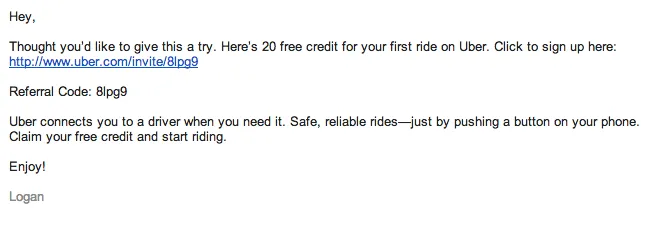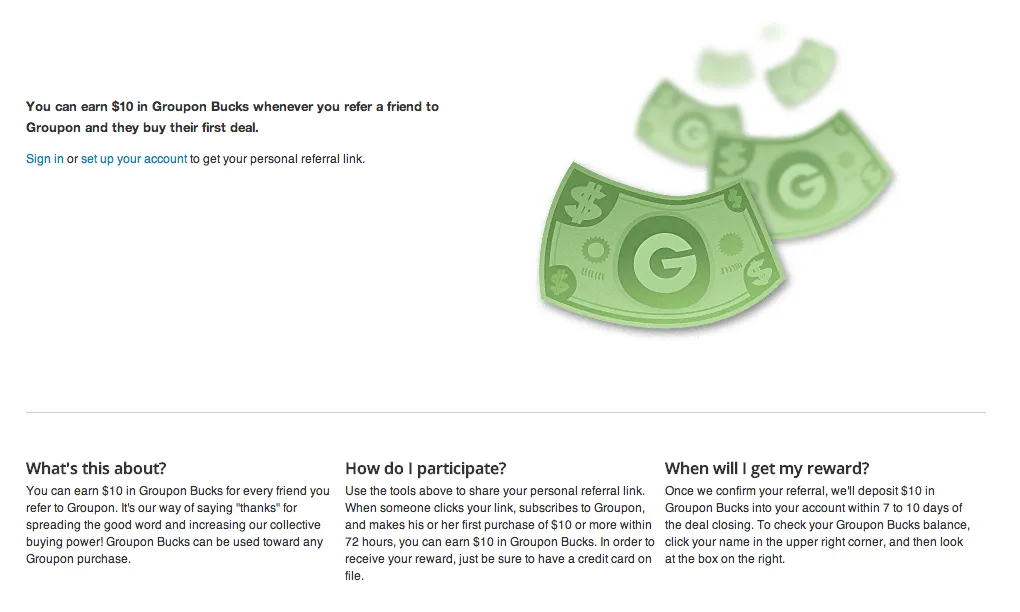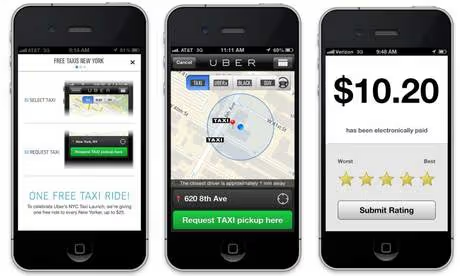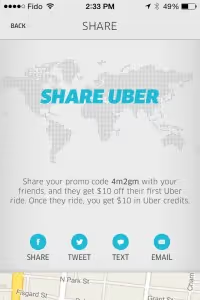How Uber Taught Me Everything There Is To Know About Referrals
On a recent trip to San Francisco I was having a drink with a friend. After the drink I needed to head across the city to a salsa party in the boonies and I wasn't sure how to get there. Probably cab. Maybe walk a bit.
My Friend: "Hey, why don't you just take an Uber?"
Me: "Oh yeah... I've heard of them, but I've never used it. Is it any good?"
My Friend: "Really? You've got to try it out. It's awesome"
Me: "I dunno, I think I'm just going to bus"
My Friend: "What's your mail address? I can send you a referral and you can get $20 of credit so your first ride will be free."
He proceeded to tell me all about Uber as he whipped out his phone, emailed me a link, and help me get setup all within 5 minutes.
I always wanted to try Uber, but it wasn't until the friend's recommendation that I went through the process of downloading the app, setting up an account, adding my credit cards, and actually using it. Since I work with referral programs, I just had to write this article dissecting the experience.
Good things get referred
What made my friend make the referral?
Well, first and foremost, my friend not only knew about Uber, but also was a big fan and vouched for the quality of the service.
That's the secret behind every referral, incentivized or not -- a quality service.
Consider the alternative. If he knew that I could be waiting for an hour to get a ride, if the app regularly crashed, if they may overcharge me, or if they had scary unsafe drivers or stinky vehicles, there is no way that he would have made the referral.
Sure, he might continue to use the service himself, but that's requires less satisfaction than a referral. If the service wasn't high quality, he wouldn't submit himself to the potential social blowback of pushing me through a bad set up process.
Satisfaction required to not cancel < Satisfication required to make a referral
Incentives work
Sure, lots of people had told me about Uber before. I knew about the service. I had just never taken action.

At one point in the conversation about Uber my friend switched from telling me what Uber was to practically pressing the buttons on my phone to make me install it.
Why did that happen?
In retrospect it was clear. He had dollar signs in his eyes. He uses Uber all the time, and was gunning for the $20 from making a referral. People like to win. They love rewards. They want to appear to be an expert, to help their friends, to have the inside scoop, and be part of a special club.
You could see the anticipation in his eyes. He was stoked that I was going down the path because he knew that there was no good reason for me to not finish setting up, get my first ride, and help him earn his referral credit.
Make it really easy to share
We were just chatting over beers at a house before this all happened, but then within 5 minutes the referral was done. It was sent, installed, tracked, and credited.
This was possible because he had Uber on his phone. He just opened the app, clicked the "email a friend" button, opened his default email client, typed the first two letters of my name, autocompleted my email, and was done.
I got the email right away, clicked a link, installed the app, and I was off to the races.
If he had to go open his laptop, wait for a sales rep to contact me, or do some sort of facebook auth invite process, I doubt it would have happened.
Uber didn't fall into the trap of wanting to collect more user data and gain access to social accounts at the expense of their referral program. No facebook apps, no clumsy lead forms, no google contact scraper, just good old fashioned email on the phone.
Everyone needs to be a winner
I don't like things that are too "salesy" and I think that I would have been put off by the experience if only my friend was getting free credit.
I experienced the other side when I tried to refer people with the Groupon referral program. When people found out I was getting $10 for referring them, and they were getting nothing, they wouldn't use my referral links almost out of spite. They felt taken advantage of and would intentionally clear browser history to avoid sending me credit.

I eventually got back to those friends to split the referral incentive with them. I didn't want to milk my friends for personal gain, I wanted to be on the same team.
"Hey Jeff, just use my referral link for your Groupon. Yes I know it's only my account that gets the $10 credit but I'll split it with you. $5 for me and $5 for you."
Uber's experience was the opposite: it was a team process -- me looking over my friends shoulder at his phone, him at mine, both excited to see the process happen. No secret kickbacks to get in the way and gum up the works. Just an open, win-win experience.
I got to try it for free
Last but not least, I got to try Uber for free.
This isn't necessarily tied to the referral program (lots of services offer free trials) but in this case Uber found a new way to offer a "free trial" in their reason to share.
Trying something new is an expensive proposition. People are creatures of habit and need an incentive to break those habits. Personally, I had an existing alternative to using Uber: a taxi. It's tried and true, and doesn't require me to risk anything because I know that it works.
I remember thinking this exact thing: "Why wouldn't I just cab it? Fine, I'll do it. But only because it's free"... and then I had my first ride, and my second, and my third. After three Uber rides, I had burned through my credit, but I was sold and kept using and paying. It had replaced my old habit. I'll probably never take a traditional taxi again.
TL;DR
An effective referral program lines up a good product and the right incentive at the right time. It builds on a solid foundation, and accelerates word of mouth growth. It takes advantage of modern communication mediums to quickly spread the word, but still works with when you're having a beer with a friend.
A good referral program has:
- A solid product. People need to trust that recommending your product won't hurt their relationships.
- An incentive for the referrer. This will get people over the line from mentioning your product, to actively helping new people get set up.
- An easy-to-use referral experience. People just don't fill out big forms, wait for slow webpages, or switch from their phone to their computer anymore. It's got to be quick and easy.
- An incentive for the new customer so that the referral seems honest, benefits everyone, and gives people an extra reason to try something new
- An ability to try for free so that people can be sold on the value of your product before they commit
- An organic word of mouth opportunity because your customers and potential customers must be connected somehow

